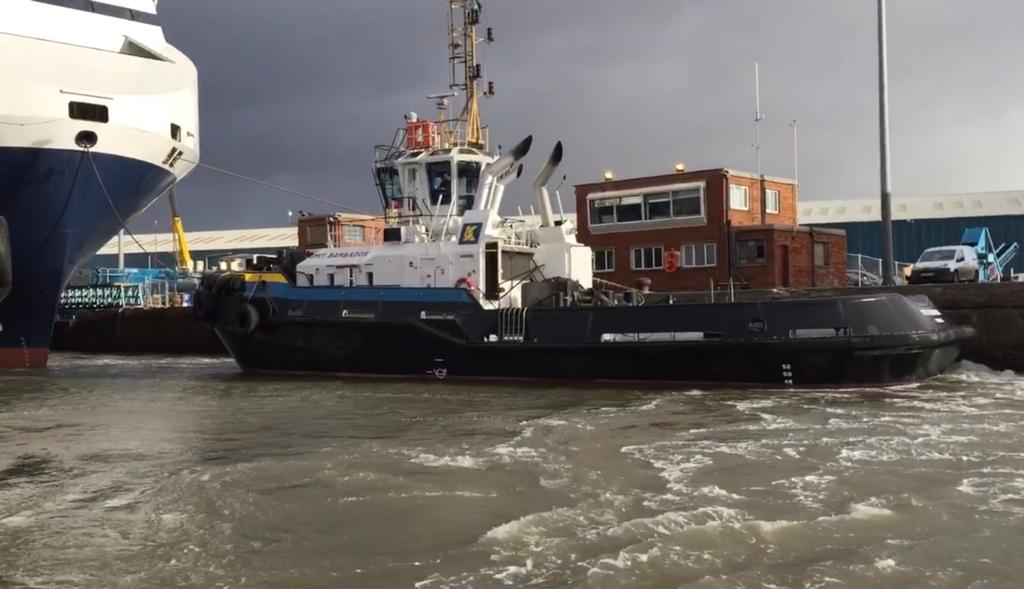|
Prayer for Liverpool
As a confirmed landlubber, I have had a curiously intertwined relationship with tugs. It all started around 15 years ago, near a certain estuary on the other side of the country. I conducted a wedding at the church where I was Vicar, and it turned out that the bride’s father, Paul, was the director of a large towage firm on said estuary. Some while after the wedding, Paul rang me to let me know that he had purchased a new tug and needed it ‘christening’. He explained that seafarers are a superstitious bunch (I had gathered that) and would be very reluctant to sail in this vessel unless she had been properly ‘done’. I indicated that I would be honoured to ‘christen’ his new tug but that I would need to research exactly how to do it. In all my time at vicar factory and in my curacy (which was about as far from the sea as you can get in the UK), I had never been instructed in the fine art of christening boats and ships. However, a phone call to a retired chaplain from the Mission to Seafarers soon enabled me to make up the serious deficiency in my skill-set, and some while later the tug was duly christened. Along with Paul’s wife, who was to smash the bubbly and name the said vessel, I was escorted up to the platform outside the bridge in order to perform the ceremony before the assembled crowd on the quayside. It was a grey, drizzly, chilly day and I shouted the words of the service without the assistance of a PA system or megaphone into the teeth of a brisk Nor’easter scything its way off the North Sea. I don’t know whether anyone could hear, but they all cheered when the bubbly was sent smashing into the side of the tug and everyone was happy that the deed was properly done. We all gratefully jumped into our cars to repair to a nearby restaurant overlooking the estuary whilst the newly christened tug steamed up and down outside the restaurant, doing pirourettes and shooting forth vast jets of water from her fire-hydrants. All good fun. Thankfully she didn’t sink and I was asked back on another five occasions to repeat the ritual with more new tugs over the years. To my knowledge, they are all still afloat! Now in Liverpool, with a view over part of the Mersey from my study window, I can actually see tugs at work almost every day. I have a direct view across to the yards of Cammell-Laird and, whenever a ship is moved in or out of their wet dock, a small army of tugs is on hand to guide her safely through the lock-gates. I often see them plying up and down the river, going to the aid of vessels entering and leaving the estuary. The picture above shows one of our local tugs, hard at work, and I am most grateful to Peter Kenny @The Floating Grace for permission to include his photograph. The tugs really are the often unsung heroes of the river in my view , small and yet powerful, able to help ships in and out of the docks. Without them, many would risk coming to grief at the mercy of the swift tides, strong winds and shifting sandbanks of the estuary and Liverpool Bay. Seeing the tugs reminds me that we all need the assistance of special people to come alongside us when we face particular challenges in our lives. One of the hardest things of the current restrictions is that we cannot phyiscally be alongside them. Even the simple, and hitherto taken for granted, aspects of daily living like meeting someone for a coffee or sitting beside their bed in hospital and holding their hand are denied to us at the moment. We can only be alongside in a virtual sense for most people. This Sunday, we will celebrate Pentecost, remembering the occasion, 50 days after the first Easter Day, when Jesus’ promise to send God’s Holy Spirit came to pass. The believers, some 120 according to Acts 1:15, were anointed with ‘power from on high’ as the Spirit came on them with visible signs of wind, fire and the ability to speak in different languages. In Acts 2:4, the word for ‘Spirit’ literally means ‘breath’, ‘wind’ or ‘air in motion’ in the original Greek. Jesus describes this ‘holy breath’ in John 14:15 as the ‘Advocate’, the Paraclete; which literally means “one sent for to assist another”. It was used in the law courts, to refer to a legal expert who would help to represent you and present your case. In the Mediterranean Sea at the time of Jesus, there were small boats sent out from the harbours to meet incoming ships offshore and to guide them safely into port. They were known as Paracletes too. Jesus is using a metaphor that would be well-known to his hearers. Entering a harbour, especially an unfamiliar one, was a dangerous business, and so it was definitely wise to send for the assistance of the Paraclete to come alongside you and guide you in. Our familiar tugs on the Mersey are, for me, metaphors which helpfully remind me of the Holy Spirit of God; the one called alongside us by Jesus. He knew that negotiating the at times turbulent waters of daily living would cause his followers much challenge and even threaten to shipwreck them altogether. So he calls the Holy Spirit alongside us to guide, protect, strengthen us and, yes, sometimes to tick us off when we’ve drifted into danger. Crucially, the Spirit helps us keep our spiritual compass pointing to Jesus, whose kingdom of light is our safe harbour and anchorage. Just as we should never take for granted our Mersey tugs and the crews who sail them, so we should always be thankful for and welcome alongside the spiritual tug that Jesus sends to meet us afresh each day. You might like to join us this Sunday on-line for our Pentecost Eucharist or for the Zone 2 service via Facebook. You will also find some of the resources that are posted alongside the act of worship to help us reflect on the events of that first Pentecost and how the Spirit can still impact us today. Even in these times when we cannot physically be alongside many of those whom we love, let’s be thankful that God never needs to practise social distancing but delights to come alongside us if we but call! Canon Neal While you're here: Why not prepare for next Sunday's worship? Our preparation sheet for adults and for children can be accessed by clicking on the Resources tab of this website: https://www.prayerforliverpool.org/prayer-resources.html.
0 Comments
Your comment will be posted after it is approved.
Leave a Reply. |
supporting you during these uncertain times AuthorLiverpool Cathedral is a place of encounter. Built by the people, for the people, to the Glory of God Archives
September 2022
|
|
Prayer for Liverpool
brought to you from Liverpool Cathedral St James Mount Liverpool L1 7AZ |
Liverpool Cathedral is a place of encounter.
Built by the people, for the people, to the Glory of God www.liverpoolcathedral.org.uk |

 RSS Feed
RSS Feed
